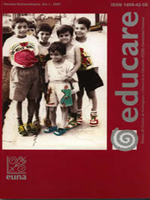Lo cotidiano: una forma básica de mirar la diversidad
DOI:
https://doi.org/10.15359/ree.1-Ext.3Keywords:
Diversity, respect, worth, human beingAbstract
By using a fragment of Jorge de Bravo’s poem, the author of this essay takes the reader into a journey of thinking about the significance of how respect for human diversity must be approached on a daily basis, since a regular need for tenderness, supper, silence, bread and home.
Our well-known poet makes one of the most consistent and vigorous statements that I can think of when he writes with poetic beauty, like if all humankind would say with him: “I am a man, I was born, I have skin and hope…”. Debravo manages to express and identify remarkably powerfully in this brief poem, some of the basic people’s rights and needs. In what I consider the major fragment of his poem he says: “I do not ask for eternities full of white stars”. Then, he gently explains: “I ask for tenderness, supper, silence, bread and home…”.
References
Elizondo, A. (2000). Cómo van conformando los niños y las niñas prácticas pedagógicas
cívicas en el quehacer cotidiano de la escuela. Investigación realizada
en la Universidad Pedagógica Nacional de México. Disponible en línea:
Freire, P. ( 1990). La naturaleza política de la educación. Barcelona: Paidós.
López, R. y España, O. (comp.) (1998). Cultura, identidades y ciberespacio: III
Congreso Latinoamericano de Humanidades. Heredia: Facultad de Filosofia
y Letras, Universidad Nacional.
Mardones, J. M. (2001). Filosofia de las ciencias humanas y sociales: Materiales
para una fundamentación científica. Barcelona: Anthropos.
Pavez, I. (2004). Filosofia para niños: apuesta hacia una reforma del pensamiento.
Pensando desde Lipman, Morin y Accorinti. Disponible en línea: http://
antroposmodemo.com.
Restrepo, L. C. (1998). El derecho a la ternura. Bogotá: Arango Editores.
Touraine, A. (1994). Crítica de la modernidad. México D. F.: Fondo de Cultura
Económica.
Published
How to Cite
Issue
Section
License
1. In case the submitted paper is accepted for publication, the author(s) FREELY, COSTLESS, EXCLUSIVELY AND FOR AN INDEFINITE TERM transfer copyrights and patrimonial rights to Universidad Nacional (UNA, Costa Rica). For more details check the Originality Statement and Copyright Transfer Agreement
2. REUTILIZATION RIGHTS: UNA authorizes authors to use, for any purpose (among them selfarchiving or autoarchiving) and to publish in the Internet in any electronic site, the paper´'s final version, both approved and published (post print), as long as it is done with a non commercial purpose, does not generate derivates without previous consentment and recognizes both publisher's name and authorship.
3. The submission and possible publication of the paper in the Educare Electronic Journal is ruled by the Journal’s editorial policies, the institutional rules of Universidad Nacional and the laws of the Republic of Costa Rica. Additionally, any possible difference of opinion or future dispute shall be settled in accordance with the mechanisms of Alternative Dispute Resolution and the Costa Rican Jurisdiction.
4. In all cases, it is understood that the opinions issued are those of the authors and do not necessarily reflect the position and opinion of Educare, CIDE or Universidad Nacional, Costa Rica. It is also understood that, in the exercise of academic freedom, the authors have carried out a rogorous scientific-academic process of research, reflection and argumentation thar lays within the thematic scope of interest of the Journal.
5. The papers published by Educare Electronic Journal use a Creative Commons License:














 The articles published by Educare Electronic Journal can be shared with a Creative Commons License:
The articles published by Educare Electronic Journal can be shared with a Creative Commons License: 



